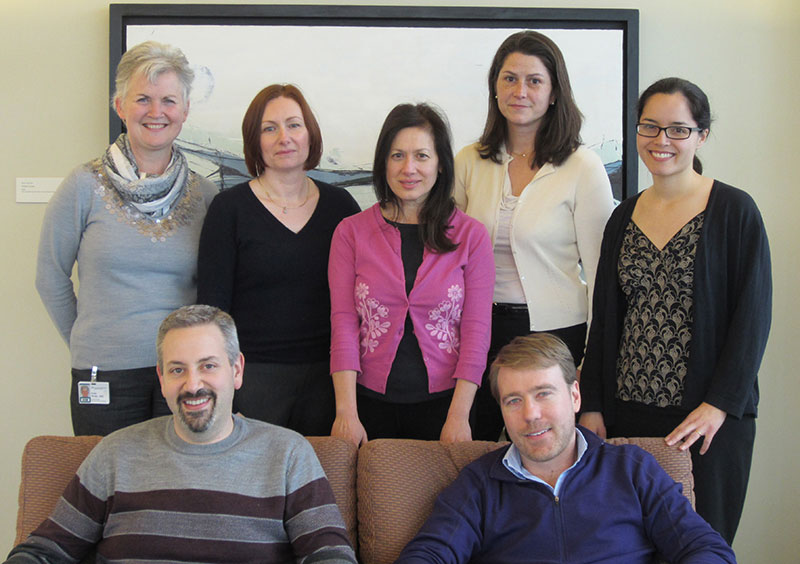For Release: March 11, 2013
Contact: Derik Hertel, 603-650-1211 or derik.hertel@dartmouth.edu
Dartmouth Researchers Receive $12 Million COBRE Grant From The National Institutes of Health

Pictured: (front row left to right) Carmen Marsit, Brock Christensen, (Back row left to right) Wendy Wells, Tracy Punshon, Margaret Karagas, Juliette Madan, Diane Gilbert-Diamond
Hanover, NH—The National Institutes of Health (NIH) has awarded a $12 million grant to support an Institutional Development Award (IDeA) Center for Molecular Epidemiology that will transform the research capacity at Dartmouth’s Geisel School of Medicine.
The five-year Centers of Biomedical Research Excellence (COBRE) grants support thematic, multidisciplinary centers that augment and strengthen institutional biomedical research capacity.
“I am very excited that Dartmouth has received this award,” said Duane Compton, PhD, senior associate dean for research and director of the Cancer Mechanisms Research Program. “It will allow us to build a center devoted to understanding how environmental exposures combine with genetic backgrounds to impact human health.
“It also recognizes the scientific strength and mentoring abilities of Dr. Margaret Karagas who has been instrumental in developing this program at the Geisel School of Medicine.”
Three Geisel School of Medicine researchers and one Dartmouth College researcher will lead four projects targeting emerging public health issues that will inform early prevention and changes in practice.
Brock Christensen, PhD, assistant professor of epidemiology, will lead the project investigating early risk factor related epigenetic alterations in breast cancer pathogenesis. He will test the hypothesis that known and suspected breast cancer risk factors contribute to epigenetic alterations in normal breast tissue to cancer.
Juliette Madan, MD, MS, assistant professor of pediatrics, will lead the project investigating the neonatal microbiome. Building on her current research in babies with cystic fibrosis and prematurity, she will investigate intestinal bacterial colonization in pre- and full-term infants and how they are connected to infection and allergy risk.
Diane Gilbert-Diamond, DSc, assistant professor of epidemiology, will lead the project investigating the relationship between in-utero vitamin D and immune function in early childhood. With a strong foundation in nutritional epidemiology, she will analyze accumulating evidence of the important role that vitamin D plays in immunity and infection, and the potential for vitamin D receptor polymorphisms to modify risk.
Tracy Punshon, PhD, research assistant professor of biological sciences at Dartmouth College, will lead the project assessing maternal-fetal exposure pathways using bio-imaging. This research will examine the relationship between maternal and infant biomarker concentrations, placental concentrations and distribution, and possible modification by candidate gene polymorphisms.
“We have an extraordinarily talented group of early career faculty conducting state-of-the-art epidemiologic research,” said Margaret Karagas, professor of community and family medicine.
“Epidemiology is becoming increasingly valued for its contribution to illuminating the causes, and in turn, prevention of human disease. We hope this new infrastructure will serve not only the institution, but the region and beyond.”
Wendy Wells, MD, professor of pathology, and Carmen Marsit, PhD, associate professor of pharmacology and toxicology, will co-direct the Biorepository Core. This Core will provide specialized expertise to the proposed projects for the five-year COBRE and produce a sustainable Core for Molecular Epidemiology.
The Geisel School of Medicine at Dartmouth, founded in 1797, strives to improve the lives of the communities it serves through excellence in learning, discovery, and healing. The nation’s fourth-oldest medical school, the Geisel School of Medicine has been home to many firsts in medical education, research and practice, including the discovery of the mechanism for how light resets biological clocks, creating the first multispecialty intensive care unit, the first comprehensive examination of U.S. health care variations (The Dartmouth Atlas), and helping establish the first Center for Health Care Delivery Science, which launched in 2010. As one of America’s top medical schools, Dartmouth’s Geisel School of Medicine is committed to training new generations of diverse health care leaders who will help solve our most vexing challenges in health care.
# # #